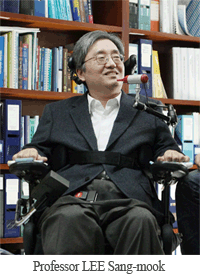 Early last year, LEE Sang-mook, 47, a professor of earth and environmental sciences at Seoul National University, was reborn. He had been paralyzed from the neck down after a car crash during an academic trip to the United States in 2006. But now, from his wheelchair, he’s lecturing and doing research again.
Early last year, LEE Sang-mook, 47, a professor of earth and environmental sciences at Seoul National University, was reborn. He had been paralyzed from the neck down after a car crash during an academic trip to the United States in 2006. But now, from his wheelchair, he’s lecturing and doing research again. The professor has two sons and a daughter. “It’s IT that brought me to life, not stem cells,” he said. In the year since he returned to the public eye, Lee, who is often called Korea’s Stephen Hawking, has inspired his fellow disabled people with his story of patience and determination. He has been promoting governmental funding to support the disabled and expand the availability of assistive technology.
There were two cups of coffee on the table. One of the cups had a straw, since the professor can only sip with the aid of an assistant. Still, Lee’s first few words at our interview were cheerful. “It’s been one year since I became a star,” he said. “And over that one year, many surprising things have happened.”
Q. Can you share some of those surprises?
A. Last November, I received a call from the Ministry of Knowledge Economy’s research and development department. They’d read an article about me in the newspaper and they wanted to invest in developing technology for the disabled. The ministry’s annual budget for the R&D sector is 4 trillion won ($3 billion), which is pretty large in scale. I agreed without a second thought.
Specifically, what is the project about?
One of the three big goals of the project is to complete speech recognition software, which is needed immediately for those who cannot move their hands freely or those with Alzheimer’s disease. Unfortunately, there isn’t a program database that reliably recognizes Korean speech. The development of a Korean database is impossible without government support, since there is insufficient demand to make it viable for a business. The second and third goals are to develop a robot assistant and vehicle for the disabled and to develop “human ware,” which involves educating the disabled in the sciences.
Can you explain what you mean by human ware?
Clever disabled students usually choose to study liberal arts. Some even decide to take the bar exam. Why? Because there are many disabled role models in those areas. In the sciences, however, there aren’t many role models who are disabled. I want to be one of those role models. I want to let them know that they are given endless choices and destinations in life, just as the regularly abled are.
And what was the Ministry of Knowledge and Economy’s response to your plans?
They said, “We will buy all of your ideas!”
How big is the project?
The research project is worth 10 billion won. The government has long wanted to promote this kind of project, but there hadn’t been enough resources or motivation. Language experts and assistive technology researchers are involved in this project. It’s a dream team. The good news doesn’t end there. Jeon Jae-hee, the minister for health, welfare and family affairs, has also promised to provide 2.7 billion won in financial assistance from the ministry’s budget to the assistive technology sector.
Won’t support from the Knowledge Ministry and the Health Ministry duplicate efforts?
Not at all ? The two are given different roles and responsibilities. The Knowledge Ministry’s role is development and the Health Ministry’s role is supply. But the biggest miracle I’m about to tell you isn’t related to the disabled.
What is it?
(The professor moved the cursor on his computer, calibrated to respond to his warm breath, and opened a Google Earth page. It showed a map of the Pacific seen from the South Pole.)
A 6,000-ton iceboat that will probe the Pacific from its South Pole base to New Zealand will be completed in October.And I’ve been given the chance to conduct research remotely on that area after the completion of the iceboat. I’m the only geophysicist in Korea who has experience studying midocean ridges. It’s a pity that you won’t be able to actually be on the iceboat. With today’s advanced communications technology, I can conduct research while at my office. It is quite a pity that I won’t be able to be on the spot and experience the excitement of discovery firsthand. But I must face reality. In fact, I wouldn’t have time to be on the iceboat either way since I’ll be fully occupied with other work at this time.
You seem to be very excited when you talk about your work related to the disabled.
I want to be remembered not as simply a passionate disabled man or a warmhearted father, but as an outstanding scientist.
What does research mean to you?
What defines me is my job. I’m dedicating my life to discovering scientific theories that the world’s 6 billion people could agree with.
Is the responsibility to discover more important than your responsibilities as a father?
After the accident paralyzed my body, I had to give up the responsibility a father has, for example, to play with his children on the weekends, to be the warmhearted head of the household and a husband. My family should accept the fact that I am not capable of doing everything.
Have you ever wished that you could hold your children again?
Well, I can’t play ball with them, but I play games with them on the PlayStation.

